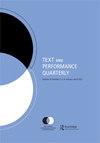Becoming a manual: au(n)to-ethnography and queer performances of a Greek theía
IF 0.4
4区 社会学
0 HUMANITIES, MULTIDISCIPLINARY
引用次数: 1
Abstract
ABSTRACT In this essay, I draw on my diasporic queer aunting experiences in dialogue with observations of embodied homemaking pedagogies to think about the aunt—specifically the Greek theía—as a guidance manual. Understanding manuals beyond written instructions, as performances that create “guidelines” to live by, I elaborate on queer autoethnography that incorporates auntieness into self-narration and analysis. Describing how I become a queer aunt, I show how aunts may serve as queer manuals that teach us to engage with heterostatic conventions of “success” and “failure” only to learn how to destabilize them from within. I frame this method as au(n)to-ethnography.成为一本手册:一个希腊人theía的民族志和奇怪的表演
摘要在这篇文章中,我借鉴了我散居海外的同性恋阿姨的经历,并通过对具体家庭制作教学法的观察,将阿姨——特别是希腊的theía——视为一本指导手册。理解书面说明之外的手册,作为创造生活“准则”的表演,我详细阐述了将阿姨气质融入自我叙述和分析的酷儿自主民族志。在描述我如何成为一名酷儿阿姨时,我展示了阿姨如何成为酷儿手册,教会我们参与“成功”和“失败”的异性恋惯例,但却学会了如何从内部破坏它们的稳定。我把这种方法定义为民族志的au(n)。
本文章由计算机程序翻译,如有差异,请以英文原文为准。
求助全文
约1分钟内获得全文
求助全文

 求助内容:
求助内容: 应助结果提醒方式:
应助结果提醒方式:


